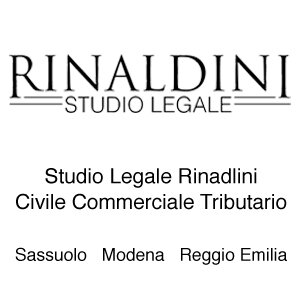Best Merger & Acquisition Lawyers in Sassuolo
Share your needs with us, get contacted by law firms.
Free. Takes 2 min.
List of the best lawyers in Sassuolo, Italy
About Merger & Acquisition Law in Sassuolo, Italy
Sassuolo is a town in the province of Modena in the Emilia-Romagna region. The local economy is strongly shaped by manufacturing, in particular the ceramic and related supply sectors, where many transactions involve family-owned small and medium enterprises. Merger and acquisition transactions in Sassuolo follow national Italian law and, where relevant, European rules. Mergers and acquisitions - often shortened to M&A - include share purchases, asset purchases, mergers, demergers, joint ventures and reorganizations. These deals require attention to corporate formalities, employee rights, tax consequences, antitrust clearance and sector-specific regulation.
Why You May Need a Lawyer
M&A transactions are complex and often involve significant financial and legal risk. You may need a lawyer if you are considering any of the following:
- Buying or selling a local company or its business unit, including family-owned operations.
- Merging two companies, or reorganizing group structures to improve efficiency or prepare for sale.
- Negotiating a share purchase agreement or an asset purchase agreement, including drafting warranties and indemnities.
- Conducting or responding to due diligence requests on issues such as contracts, intellectual property, environmental compliance, real estate titles, employment and pensions, or pending litigation.
- Dealing with employment law obligations on transfer of business and collective agreements.
- Addressing tax planning and structuring, including VAT, corporate tax and transfer pricing consequences.
- Managing regulatory approvals, including antitrust filings, sectoral permits and national security - for example golden power - reviews.
- Handling cross-border aspects such as foreign investors, international financing or EU merger control procedures.
Local Laws Overview
The most important legal frameworks to know for M&A in Sassuolo include the following:
- Italian Civil Code provisions on companies and mergers - the Civil Code contains rules on corporate governance, shareholder approvals and statutory merger procedures, including the formalities for implementing mergers and demergers.
- Legislative Decree no. 58 of 1998 - the Consolidated Law on Finance - for transactions involving listed companies or that trigger public takeover rules.
- National competition law and merger control - the Italian competition authority - Autorit� Garante della Concorrenza e del Mercato - reviews certain concentrations and can require remedies or block deals. Large transactions can also fall under EU merger control and require notification to the European Commission.
- Employment law - under the Civil Code and specific statutes, employees enjoy protections on transfer of business and collective rights. Article 2112 of the Civil Code sets rules on transfer of employees, while collective bargaining agreements can add local obligations.
- Tax law - transfers can be structured as share deals or asset deals with different tax consequences. Corporate tax, VAT, tax incentives and withholding obligations must be considered and coordinated with accounting advisors.
- Bankruptcy and business crisis rules - the Italian framework on corporate crisis and insolvency affects buyers when a target is in financial distress and requires particular care to avoid taking on hidden liabilities.
- Sector-specific rules and national security - certain sectors may trigger special authorizations or state review powers. The Italian government retains special powers in strategic sectors; foreign investments in sensitive areas may be subject to additional approvals.
- Real estate and permitting - many industrial transactions include factories, warehouses and land where title, zoning, environmental and permit checks are essential.
Frequently Asked Questions
What is the difference between a share deal and an asset deal?
In a share deal you buy the companys shares and acquire the legal entity with all its assets and liabilities. In an asset deal you buy specific assets and liabilities. A share deal is usually simpler for continuity of contracts and permits, but it can transfer hidden liabilities. An asset deal allows selective acquisition of assets and often better tax planning, but may need consent from counterparties and more administrative work.
How long does a typical M&A transaction take in Italy?
Timelines vary widely depending on complexity. A small local deal may close in a few months. More complex transactions with due diligence, financing, antitrust filings or regulatory approvals can take six months to a year or longer. Early planning and clear timetables help manage expectations.
What documents do I need to start a sale or purchase process?
Key documents include corporate statutes and shareholder registers, financial statements, tax returns, employment records, material contracts, real estate deeds, environmental reports, intellectual property filings and any pending litigation. A lawyer will prepare a checklist and usually ask for an initial data room for due diligence.
Do I need to notify the competition authority for a local transaction?
Not every transaction triggers notification. The competition authority and the European Commission have turnover-based thresholds and other criteria to determine mandatory filing. Even if notification is not mandatory, the authority can still investigate if a transaction raises competition concerns. Counsel can assess whether filing is required and handle the process.
What happens to employees when a business is sold?
Italian law protects employees on transfer of business. Employees are generally transferred to the buyer under the same terms and seniority. Collective bargaining obligations may follow. Some restructuring or redundancies after transfer require consultation with trade unions and potentially notification to employment authorities.
How are warranties and indemnities handled in Italian M&A?
Warranties are contractual promises about the condition of the business and its assets. Indemnities are contractual liabilities the seller accepts for specific risks. Parties typically negotiate scope, limits on amounts, time-limits for claims, and escrow arrangements to secure payment for potential claims.
Are there special rules for family-owned businesses in Sassuolo?
Family-owned businesses often raise issues including succession planning, shareholder disputes, minority protections and valuation disagreements. Transaction documents need to reflect existing family governance, pre-emption rights and any shareholders agreements. Local knowledge of market practices and sensitivities can be very valuable.
What tax issues should I consider in a purchase?
Tax considerations include the different tax treatment of share vs asset purchases, possible transfer taxes on real estate, VAT implications, corporate income tax effects and the use of tax attributes such as losses. A tax advisor should be involved early to model the impact and identify opportunities or risks.
Can foreign buyers acquire Italian companies in Sassuolo?
Yes, foreign buyers can acquire Italian companies. Transactions involving foreign investment may require additional filings and compliance with national security or foreign investment review regimes in strategic sectors. Exchange control is not an obstacle, but regulatory and tax planning is vital.
How much do M&A lawyers charge and how are fees structured?
Fees depend on complexity, deal size and required services. Common structures include hourly billing, fixed fees for discrete tasks, and success fees or success-based components for closing. Expect an initial retainer and clear engagement terms. Always ask for an estimate and the billing method up front.
Additional Resources
Camera di Commercio di Modena - local company registration, filings and corporate records for Sassuolo businesses.
Agenzia delle Entrate - national tax authority for VAT, corporate tax and transfer tax guidance.
Autorit� Garante della Concorrenza e del Mercato - national competition authority for merger control and competition rules.
Commissione Nazionale per le Societ� e la Borsa - CONSOB - for matters related to listed companies and public offers.
Ministero dello Sviluppo Economico - for industry regulation and foreign investment screening in strategic sectors.
Consiglio Nazionale del Notariato - for notarial formalities and deeds that may be required for certain transfers or corporate changes.
Ordine degli Avvocati di Modena - local bar association to verify lawyers credentials and disciplinary records.
Confindustria Modena and Confindustria Ceramica - industry associations relevant to manufacturing and ceramics businesses in the Sassuolo area.
Commercialisti and tax advisors - local accountants and tax professionals who assist with valuation, tax due diligence and post-closing integration.
Next Steps
1. Prepare basic company information - gather corporate documents, recent financial statements, contracts, property deeds, employee lists and any permits or licenses. Having a preliminary data room speeds up advice and valuation.
2. Schedule an initial consultation with an experienced M&A lawyer - choose counsel who understands Italian M&A law and the local market in Emilia-Romagna. Discuss objectives, timing and budget, and ask for references from similar transactions.
3. Sign a confidentiality agreement and conduct targeted due diligence - the lawyer will help structure due diligence to uncover material risks and prepare a deal timetable.
4. Consider structure and tax planning - work with legal and tax advisors to decide between share or asset sale, financing options and any tax-efficient structures.
5. Negotiate heads of terms or a letter of intent - set out the main commercial points such as price, exclusivity, and conditions precedent to guide detailed drafting.
6. Prepare transactional documents - your lawyer will draft or review the purchase agreement, disclosure schedules, escrow agreements, and any shareholder or financing documents.
7. Manage regulatory filings and closing formalities - ensure antitrust filings, sectoral approvals and any notarial acts are completed before closing. Plan for employee notifications and post-closing integration.
8. Plan post-closing steps - update company registers, tax filings, and employment records. Address any transitional services, supplier notices and customer communications.
If you are ready to move forward, contact a local M&A lawyer or firm with experience in Modena and Sassuolo. Ask about their experience with transactions in your sector, request a written engagement letter, and confirm the billing arrangement and expected timeline before formal instruction.
Lawzana helps you find the best lawyers and law firms in Sassuolo through a curated and pre-screened list of qualified legal professionals. Our platform offers rankings and detailed profiles of attorneys and law firms, allowing you to compare based on practice areas, including Merger & Acquisition, experience, and client feedback.
Each profile includes a description of the firm's areas of practice, client reviews, team members and partners, year of establishment, spoken languages, office locations, contact information, social media presence, and any published articles or resources. Most firms on our platform speak English and are experienced in both local and international legal matters.
Get a quote from top-rated law firms in Sassuolo, Italy — quickly, securely, and without unnecessary hassle.
Disclaimer:
The information provided on this page is for general informational purposes only and does not constitute legal advice. While we strive to ensure the accuracy and relevance of the content, legal information may change over time, and interpretations of the law can vary. You should always consult with a qualified legal professional for advice specific to your situation.
We disclaim all liability for actions taken or not taken based on the content of this page. If you believe any information is incorrect or outdated, please contact us, and we will review and update it where appropriate.









